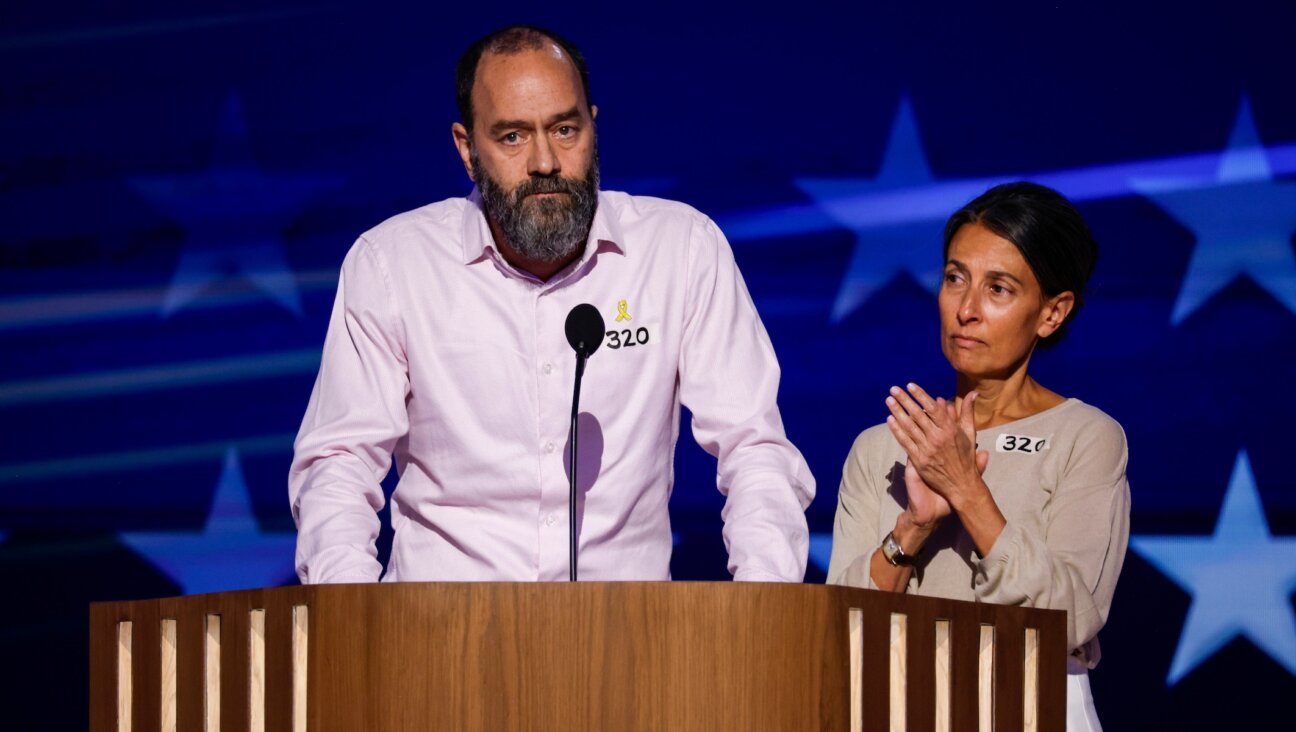Eggs and Hatred Won’t Kill Prayer at Kotel

Jenn Maggin (center) with Julie Womack (left) and Maya Glasser. Image by Jennifer Maggin
When I woke up last Monday morning, I ditched my cozy blankets and jumped out of bed before sunrise to join my fellow Hebrew Union College-Jewish Institute of Religion students as we set out on a holy mission. Heading over to the Kotel for Rosh Hodesh with Women of the Wall, we knew we were striving for social justice — that we would chant our prayers and pray with all of our heart. That day, we would work toward liberating the Kotel once and for all.
This Rosh Hodesh Av, we joined women and men praying with tallitot, kippot and tefillin as we celebrated the beginning of a new month. I felt like I was floating on a hammock of happiness while being surrounded by my HUC classmates who share the same dream of becoming Reform rabbis, cantors and educators and improving the world through Judaism. As we begin our new journey toward becoming Jewish leaders, we think about the long journey Women of the Wall has taken, and how far we have come toward freedom of prayer.
As I proudly wrapped myself inside my white and blue tallit, without panicking over the possibility of being arrested, I remembered to appreciate the feeling of freedom and security that used to be missing in action from the Kotel. Passionate and persistent women like Anat Hoffman and Lesley Sachs suffered as they got detained, arrested and harassed repeatedly. Because of their dedication and perseverance, it is now possible for my classmates and me to lock away our fears and proudly wear tallitot.
On Monday, instead of focusing on being hit by flying chairs, Women of the Wall used a chair to lift up a young girl as she bubbled with excitement and celebrated her bat mitzvah at the Kotel. What a beautiful memory for this energetic young girl. What a beautiful time in our history that a girl has the right to put on tallit and celebrate her bat mitzvah in such a sacred space.
Still, our journey for peaceful prayer at the Kotel is far from the finish line.
That same morning Haredi men assaulted a female reporter. The police blocked us off from the women’s section because apparently it overflowed with seminary girls. Instead, we prayed near the entrance of the Kotel. Singing with joy and holding our prayer books up high, we prayed as we ignored protestors who blew whistles and booed loud enough to damage their vocal chords. It is sickening and disheartening to be booed by other Jews while saying the Shema, our anthem that joins Jews together as K’lal Yisrael. Imagine just how powerful it would be if every Jew at the Kotel said the Shema together as one.
Instead, we hear a cacophony of praying, booing and whistling. I instantly feel like I am at a chaotic football game rife with bad sportsmanship. Although we are all Jews, Rosh Hodesh at the Kotel feels like we are two opposing teams. It is as if we need uniforms, cheerleaders and face paint because it turns into some sort of game or battle that neither team truly wins. The Kotel is supposed to be a place for peaceful prayer — a place where Jews have a space to pray the way they feel called to, where they can feel close to God and connected to their ancestors. Instead, Rosh Hodesh at the Kotel feels like a competition or a fight between Jews all praying to the same God.
I watched an egg bounce off the tallit of the woman next to me and crack onto the hot pavement. Instantly it reminds me of an egg on a Seder plate for Passover — the holiday that connects every Jew at the Kotel and celebrates the fact that as an entire people, we were freed from Egypt and brought into a covenant with our creator. We are all Jews, and I will never understand the idea of Jews hating Jews. A fellow rabbinical student told me that, a couple of years ago, he heard protestors make hateful comments to Women of the Wall supporters such as, “It’s people like you that made the Holocaust happen.” No matter how many hateful comments, eggs, or cries of anger accumulate over the years, we still remain hopeful. One day we will all pray together in peace at the Kotel — and that day is sooner than it seems.
A message from our Publisher & CEO Rachel Fishman Feddersen

I hope you appreciated this article. Before you go, I’d like to ask you to please support the Forward’s award-winning, nonprofit journalism so that we can be prepared for whatever news 2025 brings.
At a time when other newsrooms are closing or cutting back, the Forward has removed its paywall and invested additional resources to report on the ground from Israel and around the U.S. on the impact of the war, rising antisemitism and polarized discourse.
Readers like you make it all possible. Support our work by becoming a Forward Member and connect with our journalism and your community.
— Rachel Fishman Feddersen, Publisher and CEO























